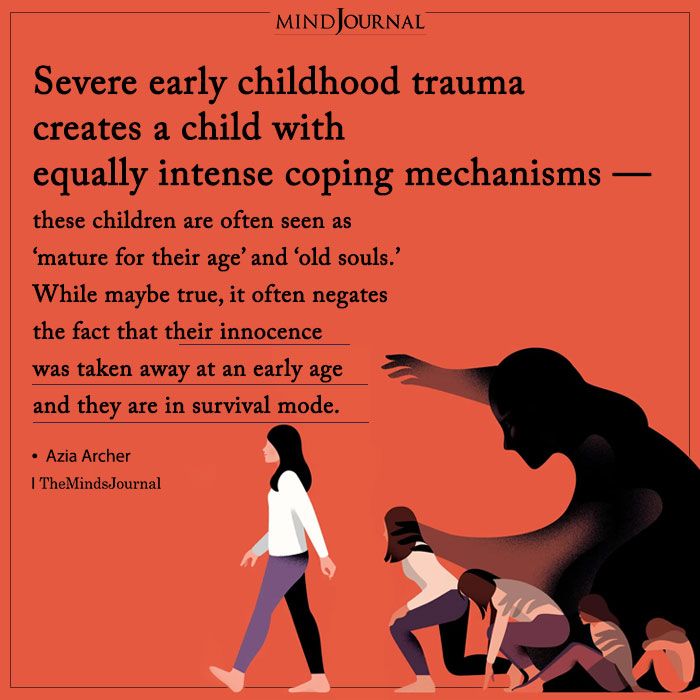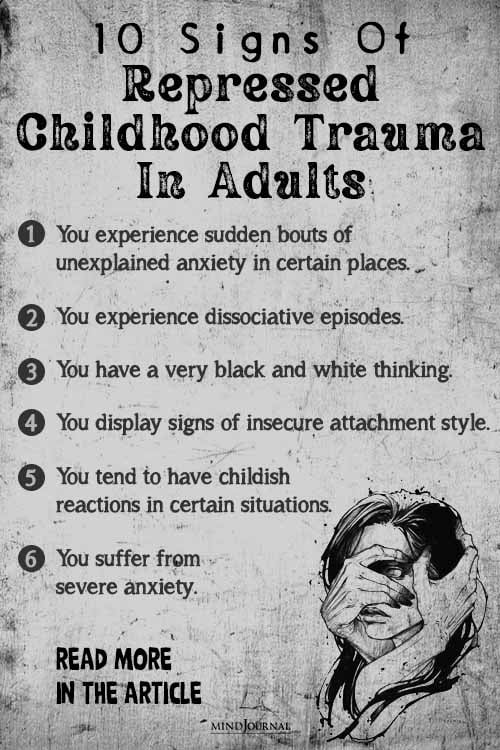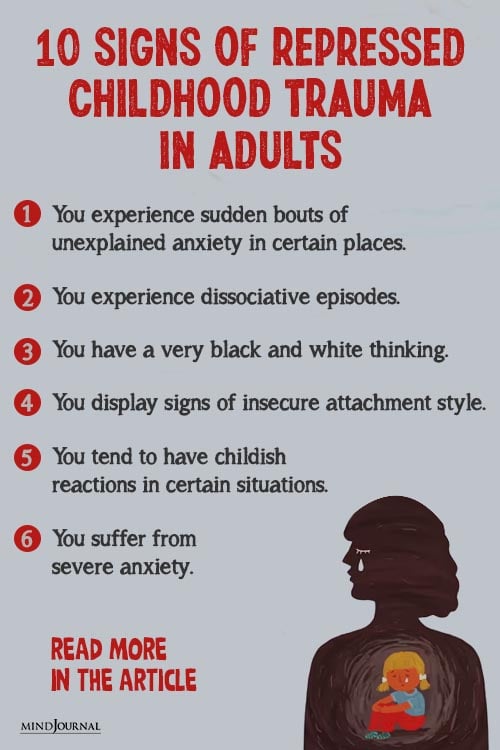Ever find yourself reacting strongly to situations and not quite sure why? Either you hear echoes of your past, or it’s probably because you listen to your inner child. In this article, we’re delving into the signs of repressed childhood trauma in adults – those subtle whispers from your younger self that can shape your present.
Picture it like a hidden script influencing your responses. But fear not, understanding these signs of repressed childhood trauma can empower you to reclaim control.
So, grab a metaphorical flashlight as we navigate through the shadows of the past, unveiling the clues that might explain those puzzling emotions and reactions you’ve carried into adulthood.
But first, let’s try to understand what is repressed childhood trauma.
Related: How To Recover Repressed Memories: 20 Ways To Rediscover Your Story
What Is Repressed Childhood Trauma In Adults?
Repressed childhood trauma in adults refers to lingering emotional wounds from early life experiences that have been pushed deep down, often unconsciously.
These unresolved issues are like undisclosed chapters in a book which may affect your reactions, relationships and well-being.
Imagine it as emotional baggage that lies hidden far back in your mind determining what you do today without even realizing it. Understanding and acknowledging these experiences can be your first step towards healing and reclaiming control over your life and emotional well-being.

10 Signs Of Repressed Childhood Trauma In Adults
1. You experience sudden bouts of unexplained anxiety in certain places.
This is one of the profound signs of repressed childhood trauma in adults.
As our brains cannot store the event itself, they take in everything around us when we go through a traumatic experience.
Maybe a certain song makes you remember something traumatic from your childhood. Maybe a certain perfume triggers your fear and anxiety. Always, always trust your gut instincts in situations like this.
For example, if going for Thanksgiving at your relative’s house has always upset you there might be something more going on here. Your senses will cue fight or flight even if your mind can’t fathom why.
2. You experience dissociative episodes.
Dissociative episodes in adults with repressed childhood trauma can be evident by your sense of detachment regarding yourself and your surroundings. Such episodes can vary as per intensity, and may even last for a few minutes or even hours.
During such an episode, you might feel as though your body is being observed by you from the outside or that you were in a world of dreams. This can also lead to you struggling with your memory and concentration.
There might be also instances where you may experience changes in your sense of time or space.
3. You have a very black and white thinking.
Another legacy of repressed childhood trauma is black and white thinking (also known as BPD splitting). This type of cognitive distortion represents the mind’s way of labelling things or people as either good or bad.
Black and white thinking is also considered to be a defence mechanism you may use to make quick decisions during times of stress, and fear.
Some after-effects that result from black and white thinking may include the following:
- Extreme mood swings
- Problems in career and professional life
- Overreactions
- Having impulsive tendencies
- Procrastination
- Poor interpersonal relationships
- Perfectionism
- Struggling to handle emotions
Related: How A Messed Up Childhood Ruins Your Adult Life
4. You display signs of insecure attachment style.
One of the major signs of repressed childhood trauma in adults is this.
Most adult survivors of childhood trauma cannot form lasting, healthy, and stable relationships. Often, these issues can be due to insecure attachment styles that develop as a result of neglectful, abusive, absent or inconsistent caregivers.
This often presents itself as an intense fear of abandonment and trust issues. You may also be excessively controlling, exhibit a pattern of shutting down, or push people away. Over time, these behaviours can adversely impact your relationships.

5. You tend to have childish reactions in certain situations.
The development of your prefrontal cortex, the part of the brain responsible for emotional and impulse control, can be seriously affected by trauma.
According to various research, this part of the brain has less activity when it comes to survivors of childhood trauma. Conversely, there is an increased activity in another part of your brain called the amygdala that deals with your emotions.
As a result, such change can sometimes lead to to childlike responses to distressing and triggering situations where the rational side of your brain tends to be underactive while the emotional one gets overactive.
6. You suffer from severe anxiety.
Anxiety is the most common mental health disorder in adults and is one of the biggest signs of repressed childhood trauma in adults.
When you experience abuse or witness violence as a child, your body goes into fight or flight mode around certain people but this feeling stays hidden until one day, someone who looks like them works alongside you.
Symptoms like staying in unhealthy and even severely abusive relationships, constant worry about being left behind, emotional instability, and more makes it a never-ending cycle.
7. You find it hard to cope with stressful situations.
We feel stress when we’re pushed out of our comfort zone or have too much on our plate but for some people, including you, this stress can feel suffocating and extremely overwhelming.
When repressed childhood trauma keeps you stuck in the childlike stage of emotional maturity you tend to fall apart instead of trying to work through it like a mature adult.
Do you have trouble coping with change? Do you experience extreme emotions that makes your daily life feel like a struggle everyday? If so, you may have repressed childhood trauma.
Related: Can Trauma Cause Memory Loss? Understanding The Link Between The Two
8. You have major trust issues.
This is again one of the major signs of repressed childhood trauma.
Do you feel like you always found it hard to trust others, even the good ones? Maybe even from what you remember in life you’ve never been given a reason to have such a strong aversion to men.
This might point to the possibility that you have repressed memories of neglect, mistreatment and abuse from your father, which you have buried deep into your subconscious mind.
If you are struggling with trust issues, the best thing you can do for yourself is seek professional help. A therapist can help you explore the root causes of your trust issues including uncovering potential trauma you’ve long since buried.
9. You have a tendency of revictimizing yourself.
Revictimization is when you repeat actions and behaviours associated with your childhood experiences, usually unconsciously. This is often a result of unresolved and repressed childhood trauma. What you fail to address will often affect your future choices, and sometimes very badly.
Some ways you may revictimize yourself include the following:
- Falling in love with neglectful, abusive, or dysfunctional partners.
- Self-destructive behaviours that keep you from reaching your goals.
- Neglecting your emotional, mental and physical needs.
- Unhealthy sexual behaviours that mimic past traumas related to sexual violence.
- Showing tendencies of abusive, mistreating or harming others.
- Allowing others to abuse you.
10. You struggle with substance abuse.
Another one of the major signs of repressed childhood trauma in adults is this sign right here.
In order the numb your pain, you resort to substance abuse, and also to punish yourself.
When something hurts you very badly, and you tend to bottle it up, it leads to you resorting to self-destructive acts, in order to deal with the pain. Take someone who was sexually assaulted for example. They may engage in an unhealthy amount of sex as a way to cope with what happened.
It’s no surprise that this behaviour puts your health at risk too. Extreme drinking, drug abuse, or even excessive smoking can destroy your physical, mental and emotional health in the long run.
Now that we know the signs of repressed childhood trauma in adults, let’s find out how to deal with repressed childhood trauma.
How To Deal With Repressed Childhood Trauma?
1. Identify and acknowledge your trauma.
If you’re wondering how to deal with repressed childhood trauma, this is probably the most important step.
Sometimes, it might feel easier to bury the feelings tied to trauma or pretend like it never happened at all. It’s also possible for your body and mind to respond to certain triggers even if you don’t consciously remember the traumatic event.
However, acknowledging your trauma and pain is one of the first steps in healing and moving on with your life. The moment you acknowledge what you have been through, all your triggers and it’s effects on you and your life, you choose to break the cycle and take back control.
Related: 25 Signs You Have a Wounded Inner Child and How to Heal
2. Work on replacing your harmful habits with healthy ones.
Bad habits can take many forms, such as negativity and always mistrusting others or turning to alcohol or drugs when your feelings become too hard to bear. Harmful habits can be hard to break, especially when you use them as crutches to help you avoid reliving the pain and trauma of your childhood.
Having a support group or a therapist can help you learn the tools necessary to break your bad habits and replace them with healthy ones.
3. Don’t feel ashamed to seek professional support.
Without proper support, trauma can remain in your body and continue to affect your mental and physical health.
Trauma-related symptoms include difficulty concentrating, sleeping, and eating — also linked with anxiety, depression, PTSD, increased substance use, emergency room admissions, and general feelings of unhappiness.
These forms of therapy can be very effective for healing your trauma:
- Cognitive behavioural therapy (CBT)
- Exposure therapy
- Trauma-focused CBT (TF-CBT)
- Eye movement desensitization and reprocessing (EMDR)
- Deepen your understanding of your trauma
4. Conquer your pain and work towards reclaiming your life back.
This is one of the most important things you need to do if you are thinking about how to deal with repressed childhood trauma.
Helplessness can carry well over into adulthood causing a victim mentality that makes you feel like one which will lead to you making choices based on your pain and trauma. When you see yourself as a victim, your past controls your present.
But when you’ve defeated your pain, your present is in your hands. There may always be a battle between your past and present but as long as you’re willing to let go of your old defences and crutches you used as a child to deal with your pain and trauma, you will be able to heal your pain.
Related: 7 Steps To Healing Childhood Trauma As An Adult
5. Have faith and be patient with yourself.
Change never happens overnight, and good things always take time. Repressed childhood trauma can have long-term consequences, such as toxic relationships, disturbing flashbacks and volatile emotions.
If you are experiencing repressed childhood trauma, you may also have certain triggers — including smells, sounds, and situations — which can unexpectedly remind you of the traumatic event.
How you respond to trauma can be different from others, so don’t be too hard on yourself, instead show yourself the compassion and patience you might show others. That’s what’s going to help you heal.

So, these were all the signs of repressed childhood trauma in adults. Did you identify with any of them? Do let us know your thoughts in the comments down below!












Leave a Reply